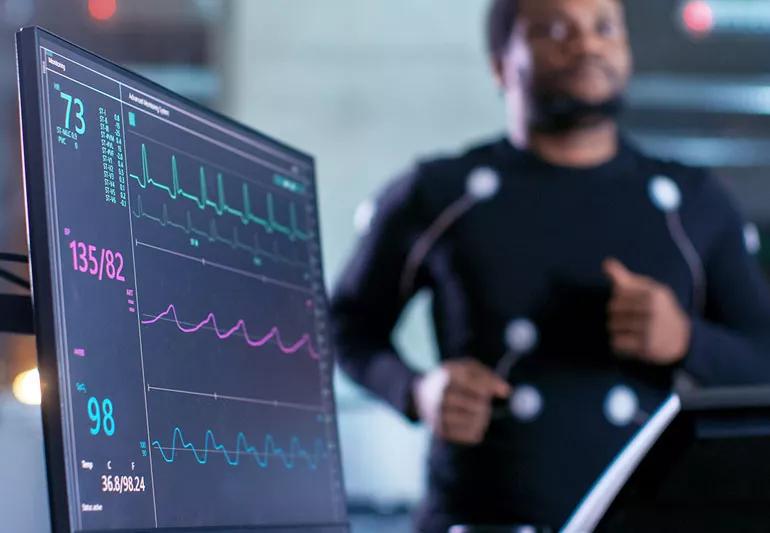Information you need, on and off the field

You’re preparing for your sports physical, and your doctor comes at you with a cold stethoscope, ready to listen to your heart. But what does your heart have to say? Potentially, a lot, according to cardiologists Tamanna Singh, MD, and Michael Emery, MD.
Advertisement
Cleveland Clinic is a non-profit academic medical center. Advertising on our site helps support our mission. We do not endorse non-Cleveland Clinic products or services. Policy
Made up of four chambers and four valves, one of your heart’s most important jobs is to keep blood flowing in one direction. The valves work like one-way swinging doors that let your blood move to the next chamber or to the major arteries of your body, but never backward.
When your doctor listens to your heart, a “lub-dub” sound can be heard when your heart valves close. But sometimes, a “whoosh” or “swish” sound also can be heard due to turbulent blood flow near your heart. That’s a heart murmur.
In athletes, most murmurs are called physiological, or “innocent” murmurs. They can be a sign of increased cardiovascular fitness rather than a harmful heart abnormality.
“In response to consistent, high levels of endurance activity, your heart may adapt by becoming slightly enlarged, which allows it to move greater amounts of blood with each contraction,” says Dr. Singh. “That amount, called the stroke volume, is sometimes heard on physical exam when your doctor places a stethoscope to your chest,” she says. This finding is more prominent in young athletes and aerobic endurance athletes.
However, that swishing sound can also be related to a problem with the heart.
The murmur may represent turbulent blood flow related to narrowing or leaking of one or more of the heart valves — or, rarely, a small hole in the heart. Dr. Emery says it could also be due to a condition called hypertrophic cardiomyopathy, which can cause abnormal thickening of your heart muscle. This can block or reduce the blood flow from the left ventricle of your heart to the aorta (the body’s main blood vessel).
Advertisement
“So, if your doctor hears a heart murmur, it’s important to determine the cause for this sound,” says Dr. Emery. Is it innocent? Or is it caused by abnormal pathology? He says on a rare occasion, a murmur may be a sign of a greater problem that would place an athlete at risk of sudden cardiac death or other health issues.
Your doctor should be able to tell the difference between a physiological murmur (considered a normal and benign finding) and pathological murmur (cause for follow-up), based on the timing and pitch of the murmur.
But if there’s still any question of how significant the murmur is, then your doctor will likely order an echocardiogram. This is an ultrasound of your heart, and it’s performed by placing a special wand on your chest that uses sound waves to create a computerized picture of your heart as it beats.
An echocardiogram also shows the size of your heart’s chambers, how well your heart is pumping, and how efficiently the valves are opening and snapping shut.
If you do have a pathological heart murmur, your doctor will let you know if you need treatment (not all require treatment), and how the condition may or may not affect your day-to-day activities, including sports participation.
“In most cases, people with murmurs have no symptoms,” says Dr. Singh. But the most common symptoms athletes report include shortness of breath or chest pain with activity and a decrease in exercise capacity. Others can experience lightheadedness and fainting episodes.
These symptoms occur because the forward flow of blood is limited, and without adequate nutrient-rich blood flow reaching the active muscles and organs, performance declines.
However, it’s also important to know that heart murmurs can, in some rare instances, exclude you from sports participation. If you have an underlying heart condition, vigorous exercise can increase the stress placed on your heart, and in some cases may lead to arrhythmias or a more rapid deterioration in heart function.
On rare occasions, if a detected heart abnormality carries a significant risk of long-term damage to your heart or sudden cardiac death, you may need to stay off the field for your health.
Your heart may be trying to tell you something — and your sports cardiologist can tell you what it is.
Advertisement

Sign up for our Health Essentials emails for expert guidance on nutrition, fitness, sleep, skin care and more.
Learn more about our editorial process.
Advertisement

Heart murmurs are quite common in kids and often fade away over time

It’s an emergency if the pain doesn’t go away, gets worse or you have other worrying symptoms

Your diet in the weeks, days and hours ahead of your race can power you to the finish line

Squats are foundational for building strength in your legs, glutes, quads and core muscles

A consistent walking program is an effective way to drop pounds and lose body fat

From playful movement to strength-building, kids need exercise to stay healthy and strong

You can improve your athletic performance over time by breaking up your workout regimen into focused cycles

Start training with full-body workouts at least six to eight weeks before you hit the slopes

Even small moments of time outdoors can help reduce stress, boost mood and restore a sense of calm

A correct prescription helps your eyes see clearly — but as natural changes occur, you may need stronger or different eyeglasses

Both are medical emergencies, but they are very distinct events with different causes